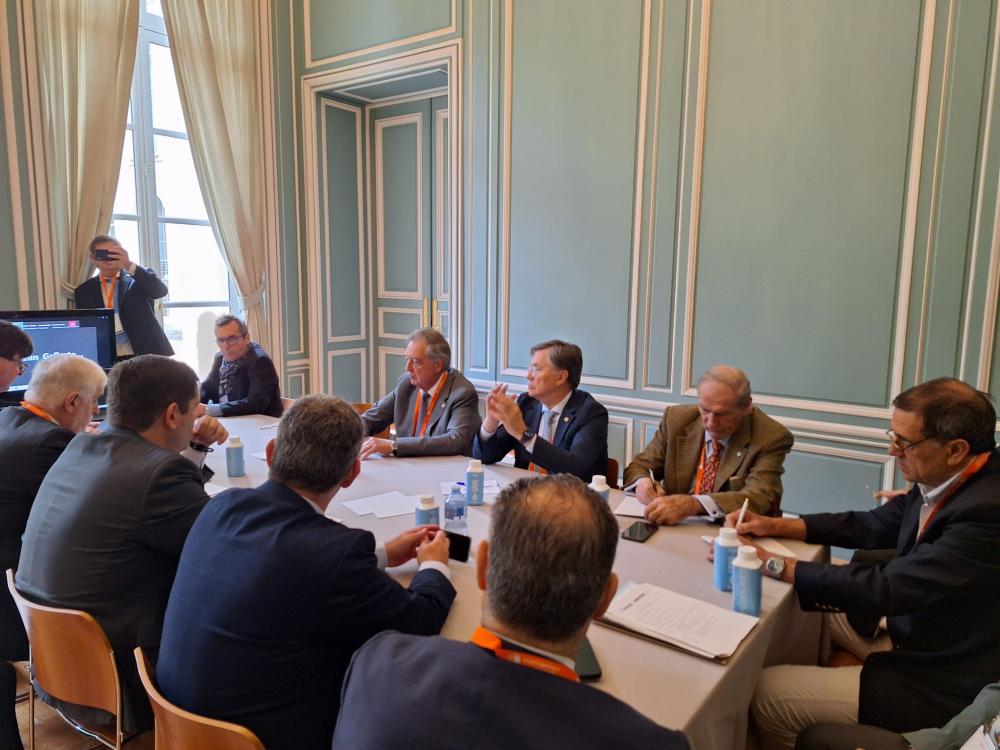Ministers of the Southern Agricultural Council (CAS) emphasize the need to strengthen coordinated action against international food trade barriers based on environmental reasons that are not science-based

París, 28 May 2024 (IICA) – The need to make visible the advances in the region's agricultural activity in favor of greater sustainability and to strengthen coordinated action against environmentally-motivated international trade barriers were the main topics of a working meeting of agriculture ministers and high-level authorities that make up the Southern Agricultural Council (CAS).
Participants in the XVII extraordinary meeting of CAS explained that the European Union (EU) Regulation 1115/2023 against deforestation, which is set to come into effect next January, is not based on science, and that there is great uncertainty about its application, which could be detrimental. They also stated that the countries of the South have developed sustainable production schemes.
The General Assembly of the World Organization for Animal Health (WOAH) is being held in Paris this week, which is why the CAS meeting took place in the French capital as well. The WOAH, which is celebrating its centenary this year, is the institution that coordinates global action against animal diseases that pose a threat to food security and economic growth, making it of major importance for the productive systems of the Southern Cone.
Attending the CAS meeting were Fernando Vilella, Secretary of Bioeconomy of Argentina and pro tempore president of CAS; Fernando Mattos, Minister of Livestock, Agriculture and Fisheries of Uruguay; Esteban Valenzuela, Minister of Agriculture of Chile; Carlos Goulart, Secretary of Agricultural Defense of Brazil; José Carlos Martin, President of the National Animal Health and Quality Service (SENACSA) of Paraguay; and Manuel Otero, Director General of IICA.
Also present were Gastón Funes, Agricultural Attaché of Argentina to the European Union (EU); Carlos Cherniak, Permanent Representative of Argentina to FAO; Daniela Acuña, Deputy Director of the Office of Agricultural Studies and Policies (ODEPA) of Chile; Santiago Derqui, Chief of Staff of the Secretariat of Bioeconomy of Argentina; Martín Rapetti, Vice President of the Federation of Rural Associations of Mercosur (FARM); and Gabriel Delgado, Technical Secretary of CAS and IICA Representative in Brazil.
For more than 20 years, the CAS, whose technical secretariat is managed by the IICA, has played a strategic role as a forum for consultation and coordination of regional actions, comprising the Ministers of Agriculture of Argentina, Bolivia, Brazil, Chile, Paraguay, and Uruguay.
“International trade restrictions imposed on those who sell agricultural products and cannot certify non-deforestation are not based on science. But one must choose between being right or wanting to sell, and for this reason, we have already advanced in exporting certified deforestation-free beef and soy to Europe,” said Vilella.
For his part, Minister Mattos indicated that “politically, we reject this regulation, which constitutes an additional environment-based trade restriction. However, the requirement exists, and we must be prepared, although this does not mean we should not take all possible actions to postpone the implementation of Regulation 1115.”
“We cannot accept that the Europeans are the champions of environmental protection, when it is in our region where natural resources are protected,” added Mattos.
José Carlos Martin, head of the public institution that controls animal health in Paraguay, questioned how quickly the regulation must be implemented and the lack of clarity regarding the requirements to comply with it. He referred to the need for the countries in the region to undertake a collective strategy of dialogue and negotiation.
The Minister of Agriculture of Chile, Esteban Valenzuela, stressed the importance of CAS’s work as a key forum for the exchange of information and coordinated and concerted action in the face of common challenges in areas such as health or climate resilience. He said that common denominators can also be scaled up to the continental level. Additionally, he recalled the commitment made at the 1st Ministerial Conference on Low-Emission Food Systems, held last year in Chile, where 24 countries from five continents committed to working to position agriculture as a relevant sector to offer innovative solutions to the climate crisis.
Residues and pesticides
The ministers also discussed the European policy on maximum residue limits and pesticide reduction. They emphasized that, although it is presented as an environmental issue, it is actually a matter of food safety.
In this regard, it was agreed to work together and undertake coordinated action in the various forums where this issue is being discussed.
Carlos Goulart, the representative of Brazil, focused on the importance of the region jointly rejecting the imposition of single production models, which do not recognize the singularities, good practices, and production traditions of each area.
The meeting also included a presentation on the initial progress of the coordinated actions of CAS countries, in collaboration with the private sector, to strengthen research on greenhouse gas (GHG) emissions and sequestration attributable to agriculture in the region. This is the implementation of a decision made at the previous CAS session, which took place in March in Argentina, and whose goal is to visibilize the sector's contribution to climate change mitigation.
The CAS session in Paris also revealed regional cooperation projects being carried out to combat the New World screwworm fly and the fruit fly, pests that transcend national borders and threaten the income of agricultural producers as well as food security.
More information:
Institutional Communication Division.
comunicacion.institucional@iica.int